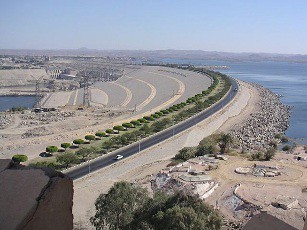
The Great Renaissance Dam Project in Ethiopia. The government of Sudan has pledged support for the project., a photo by Pan-African News Wire File Photos on Flickr.
SATURDAY 19 OCTOBER 2013
Downstream countries to hold talks with Ethiopia over dam row
By Tesfa-Alem Tekle
October 18, 2013 (ADDIS ABABA) – Officials from Ethiopia, Egypt and Sudan will meet next week to commence discussions over concerns about a massive hydropower plant project that Addis Ababa wants to build on the Nile River.
“The meeting is scheduled to take place on 22 October between officials of the three countries”, said Fekahmed Negash, boundary and trans-boundary rivers affairs director at the ministry of water, irrigation and energy.
According to Negash, the three parties will discuss ways of implementing the final recommendations announced in June by the international panel of experts who were tasked to assess the possible impacts of Ethiopia’s grand renaissance dam project on downstream countries.
In their final findings, a panel of 10 experts conclused that the dam project won’t have a significant effect on lower riparian countries.
Following the report’s release, Sudan accepted the final findings and even offered to send experts and technicians to help with the construction of the dam.
However, Egypt has refused to accept the report’s conclusions, calling for more studies and consultations with Ethiopia and Sudan.
The meeting, which has previously been cancelled twice before, will be held in Khartoum.
According to the ministry, the tripartite meeting will be the first since the international panel of experts submitted their final findings to the governments of the three countries.
The panel’s report hasn’t yet been made public, but Negash says experts recommended further studies to analyse the impact of the dam on Egypt’s water use and future Nile dams to be built by Sudan and Ethiopia.
Egypt fears that the $4.6-billion mega dam project, which Ethiopia is building near the Sudanese border, would diminish water flows to its territory and insists that its historic water rights be respected.
The Nile River, of which Ethiopia sources 85%, is a lifeline to over 90% of Egyptians.
When the 6,000 megawatt plant is completed, Ethiopia plans to sell clean and cheap energy to neighbouring countries, including Egypt.
The project, which Ethiopia is fully funding from its own coffers, is currently 23% completed.
(ST)
No comments:
Post a Comment